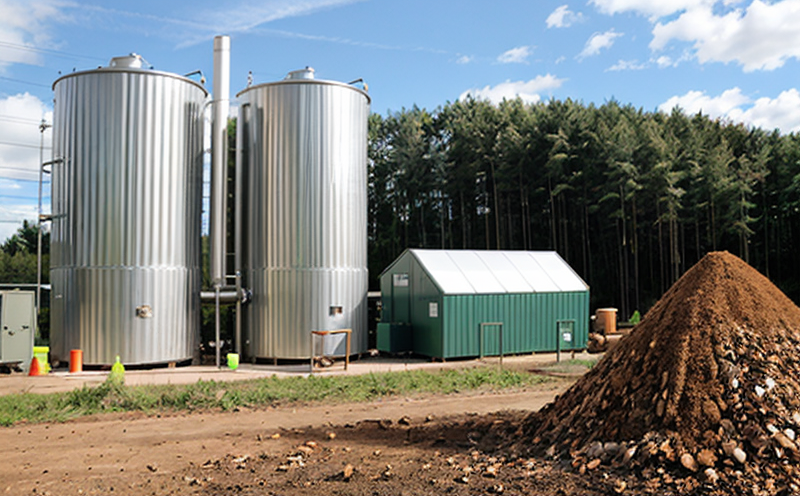EN 15442 Sampling of Waste Fuels for Energy Recovery
The European standard EN 15442 outlines detailed procedures for sampling waste fuels intended for energy recovery. This is a critical step in ensuring that the fuel meets all necessary criteria for efficient and environmentally sound conversion into energy.
Sampling of waste fuels plays a pivotal role in waste-to-energy (WTE) processes, as it directly impacts the quality and efficiency of energy production. The standard ensures consistency and reliability by providing clear guidelines on how to collect representative samples from various types of waste fuels.
The process begins with the identification of suitable sampling points within the waste stream. These points must be chosen based on their potential to represent the overall characteristics of the waste fuel. Factors such as particle size, moisture content, and ash content are crucial in determining these representative samples.
Once identified, the sampling equipment should be calibrated according to EN 15442 specifications. Proper calibration is essential for accurate measurement of key parameters like calorific value, which directly influences the energy yield from the waste fuel. The standard also emphasizes the importance of maintaining a controlled environment during sample collection to avoid contamination and degradation.
A significant aspect of this service involves the use of advanced sampling techniques tailored to different types of waste fuels. For instance, solid biomass residues may require different handling than liquid or semi-solid materials. The selected method must ensure that the collected sample accurately reflects the characteristics of the entire batch of waste fuel.
The standard also covers the storage and transport of samples from the point of collection to the laboratory for analysis. Proper packaging is critical to prevent any changes in the sample's condition, which could skew results and affect the accuracy of the subsequent testing process.
Upon arrival at the lab, the samples undergo rigorous examination using state-of-the-art equipment calibrated to international standards such as ISO 17025. This ensures that all tests conducted are accurate and reliable, providing a solid foundation for informed decision-making in waste management and recycling processes.
The ultimate goal of EN 15442 is to provide a robust framework for ensuring the quality and consistency of waste fuels used in energy recovery systems. By adhering strictly to these guidelines, facilities can optimize their operations, reduce costs, and enhance environmental performance.
Understanding the intricacies of this process requires knowledge not only of the standard itself but also of how it fits into broader waste management strategies. This service is designed to support clients in achieving compliance with regulatory requirements while enhancing operational efficiency and sustainability.
Benefits
- Enhanced Compliance: Ensures adherence to EN 15442, a key requirement for waste-to-energy facilities.
- Improved Efficiency: By providing representative samples, the process optimizes energy recovery operations.
- Informed Decision-Making: Accurate sampling leads to better-informed decisions regarding fuel quality and potential.
- Reduced Environmental Impact: Ensures that only suitable waste fuels are used in energy production, minimizing environmental harm.
- Cost Savings: Optimized processes reduce operational costs associated with inefficient energy recovery.
- Sustainability: By ensuring high-quality fuel inputs, this service supports sustainable waste management practices.
Quality and Reliability Assurance
The implementation of EN 15442 ensures that the sampling process is conducted with precision and consistency. This is achieved through rigorous calibration of equipment, adherence to specified sampling points, and attention to storage and transport conditions.
Regular audits and reviews by qualified personnel ensure that all steps in the sampling process meet the required standards. The use of advanced analytical techniques further enhances reliability by providing precise measurements of key parameters such as calorific value, moisture content, and ash content.
The laboratory’s commitment to quality is reflected in its ISO 17025 accreditation, which guarantees that all tests are conducted under controlled conditions and meet the highest standards of accuracy. This accreditation also ensures traceability and transparency, crucial for maintaining trust with stakeholders.
By focusing on these aspects, this service not only meets regulatory requirements but also contributes to the broader goals of sustainable waste management and recycling.
Environmental and Sustainability Contributions
The testing and sampling services provided under EN 15442 play a vital role in promoting sustainability within the waste-to-energy sector. By ensuring that only suitable waste fuels are used, this process reduces greenhouse gas emissions associated with inefficient energy recovery.
Moreover, accurate sampling helps optimize fuel quality, leading to more efficient combustion processes and reduced air pollution. This contributes significantly to environmental protection by minimizing harmful emissions such as particulate matter, nitrogen oxides, and sulfur dioxide.
The service also supports the circular economy model by maximizing the value of waste materials while minimizing their negative impact on the environment. By promoting the use of suitable waste fuels in energy production, this process facilitates a more sustainable approach to resource management.
Furthermore, adherence to EN 15442 fosters transparency and accountability within waste management operations, encouraging best practices that benefit both the environment and society as a whole.
This commitment to sustainability is further enhanced by the use of advanced technologies and methodologies that ensure accurate and reliable sampling. By investing in these services, facilities can play an active role in contributing to global efforts towards environmental stewardship.





